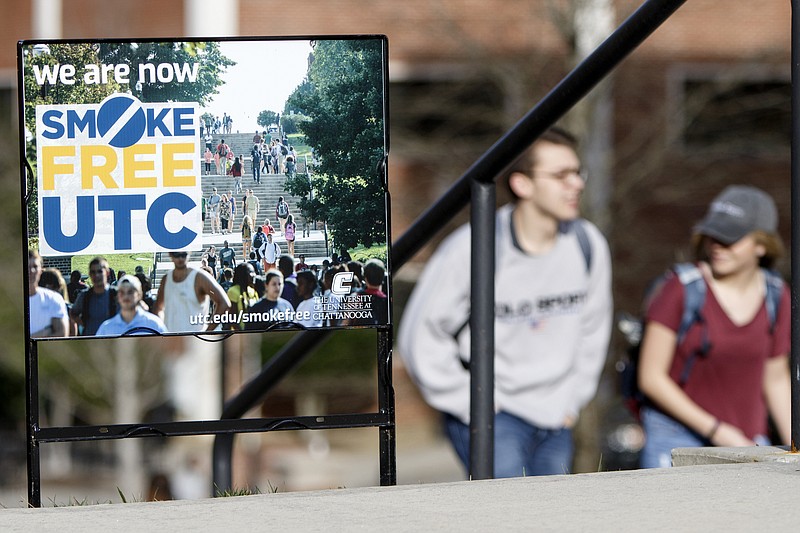Students, faculty and visitors craving a puff from a cigarette or e-cigarette on the University of Tennessee at Chattanooga's campus aren't able to enjoy one under the school's new smoke-free policy.
The policy, officially enacted on Jan. 1, bans smoking of any lighted tobacco product on all university-controlled property, even in private vehicles.
"We knew we wanted to go to a smoke-free environment because those who are impacted by secondhand smoke don't have the decision to be affected by it," said Tricia Henderson, interim director of UTC's Center for Student Wellbeing. "We wanted to be part of the trend in moving toward a healthier campus and a campus where people could live without smoke."
About 90 percent of UTC's students and faculty report in campus surveys they don't smoke, Henderson said.
Nationwide, smoking rates have declined from 20.9 percent of the adult population smoking in 2005 to 15.1 percent in 2015, according to the U.S. Centers for Disease Control and Prevention.
More than 2,000 college and university campuses across the country have already moved to being smoke-free, said Karissa Peyer, assistant director of Exercise Science, Division of Health and Human Performance at UTC. Locally, Hamilton County Schools instituted a tobacco-free policy, not just limited to smoking itself, in 2018.
UTC's policy is not meant to be punitive, school officials say.
"We are really trying to emphasize a culture of care and a culture of resources and support," Peyer said.
She added that many workplaces UTC graduates will join also have moved to smoke-free environments.
"Part of our job as a university is to prepare our students to enter the workforce and for employers who might have similar bans," Peyer said.
Though repeat offenders of the policy, particularly students who live in university housing, can be called before the UTC Student Conduct Board or Human Resources, officials expect campus visitors to self-regulate themselves and others.
"We are going to ask our community to be accountable to each other," Henderson said. She said the UTC community seemed mostly happy about the policy, but there was some concern, especially among current smokers.
"There have been some concerns from faculty and staff and students who are smokers who are working or living here on campus, but for the most part most have been really positive and excited," Henderson said.
The university is offering a variety of cessation resources to both faculty and students who are hoping to quit smoking, though Henderson said forcing people to quit is not the intent of the policy.
Student Health Services is providing smoking cessation assistance to faculty, staff and students free of charge and offers tobacco quitting aids such as nicotine gum and patches as well as counseling and other assistance. The university also will refer those who express a desire to quit to local cessation support programs and other community resources.
UTC began forming its policy more than a year ago with the help of a policy committee and the Student Government Association. The University of Tennessee at Knoxville has since banned smoking from its campus.
Peyer said the time it took to roll out the policy at UTC was intentional.
"We consciously wanted to make it a gradual change," she said. "The biggest strength of our policy is the time it took to implement and the input we got from faculty, students and the community."
Contact staff writer Meghan Mangrum at mmangrum@timesfreepress.com or 423-757-6592. Follow her on Twitter @memangrum.
